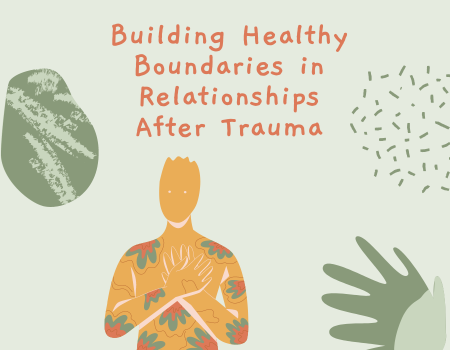Trauma can have a profound impact on our sense of self and our ability to navigate healthy relationships. Healthy boundaries, those invisible lines that define our emotional and physical space, become especially crucial as we rebuild trust and safety. Yet, for trauma survivors, boundaries can feel foreign or even frightening. Here’s a guide to understanding the importance of boundaries in healing and practical tips for building them in your relationships.
 Why Healthy Boundaries Matter After Trauma:
Why Healthy Boundaries Matter After Trauma:
Trauma often involves a violation of boundaries, leaving survivors feeling unsafe and out of control. Re-establishing healthy boundaries is essential for reclaiming your sense of self and creating safe, fulfilling relationships. Boundaries:
- Promote Safety: They create a clear line between what is acceptable and unacceptable behavior from others. This helps prevent further emotional or physical harm.
- Foster Self-Respect: Knowing your limits and enforcing them promotes self-respect and empowers you to prioritize your well-being.
- Enable Healthy Relationships: Boundaries allow for mutual respect and trust, fostering genuine connection with others.
Common Challenges with Healthy Boundaries After Trauma:
- Difficulty Saying No: Trauma can make it difficult to assert your needs and set limits. You may feel obligated to please others or fear rejection for expressing boundaries.
- People Pleasing: You may prioritize others’ needs over your own, leading to resentment and emotional exhaustion.
- Hypervigilance: Constant alertness and difficulty trusting others can make it hard to relax within relationships.
- Fear of Conflict: The possibility of conflict can trigger anxiety, leading you to avoid setting boundaries or expressing your feelings.
Building Healthy Boundaries: A Step-by-Step Guide
- Identify Your Needs: Reflect on what’s important to you in a relationship. What makes you feel safe, respected, and valued?
- Communicate Your Boundaries: When you know what you want, communicate them clearly and concisely to others. Use “I” statements to express your needs and boundaries. For example, “I feel uncomfortable when I’m interrupted. I would appreciate it if you could wait until I’m done talking.”
- Practice Assertiveness: Assertiveness is about expressing your needs respectfully without aggression. Role-playing with a trusted friend can help practice asserting your boundaries.
- Be Prepared for Resistance: Others may not always respond positively to your newly established boundaries. Prepare for potential resistance and remain firm but respectful.
- Respect Other People’s Boundaries: Building healthy boundaries is a two-way street. Respect other people’s boundaries as well.
Additional Tips:
- Start Small: Don’t overwhelm yourself. You can begin by setting boundaries in small ways that can be managed easily, and then gradually build your confidence.
- Seek Support: A therapist can provide invaluable support in identifying your needs, practicing assertiveness, and navigating challenging relationships.
- Self-Care is Key: Prioritizing your physical and emotional well-being strengthens your ability to set and maintain boundaries.
- Celebrate Your Progress: Acknowledge your growth and celebrate each step you take in building healthy boundaries.
Moving Forward with Confidence
Building healthy boundaries can be a challenging yet empowering journey. When you understand the importance of boundaries in healing, recognizing the challenges, and taking steps to assert your needs, you can create safe, fulfilling relationships. Boundaries are not about pushing people away; they are about creating the space you need to heal, thrive, and connect authentically with others.
